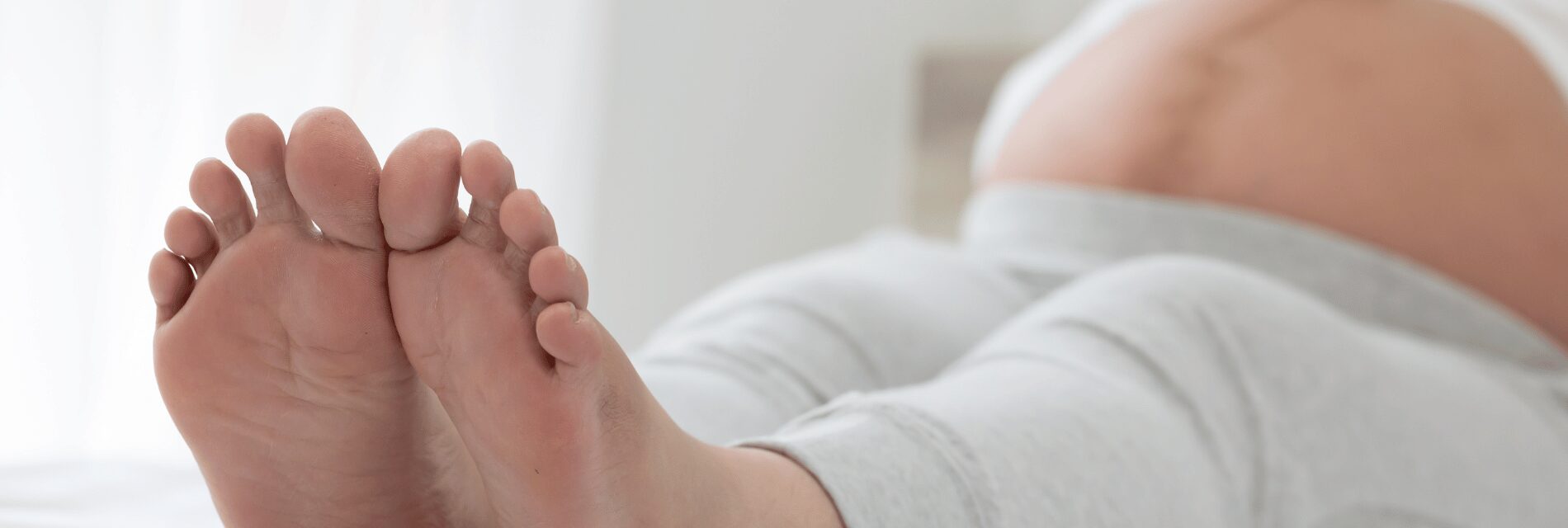
Are Itchy Feet During Pregnancy A Sign Of Cholestasis?
You may have heard a number of times that your body changes drastically during pregnancy. There are a number of health, skin, and hormonal issues that go on during those nine months that are mostly impossible to understand. But have you heard about itchy feet during pregnancy?
While not being one of the less-talked-about issues during pregnancy, itching, which is also called pruritus, is a very common complaint among pregnant women. While some tend to experience itching all over their body, others experience it in very selective parts of their bodies, like the belly, hands, feet, or chest.
Even the slightest itching causes a feeling of irritation, but when it gets severe, it may result in loss of sleep or hint towards a very serious medical issue. In this article, we shall talk about the “not so much talked about issue” of pregnancy – itchy feet, and understand the causes behind it and what to do when things get out of hand.
Common Reasons Behind Itchy Feet During Pregnancy
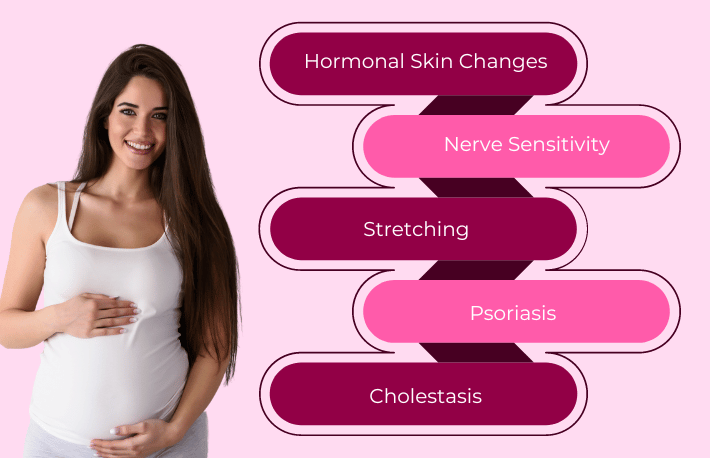
There are multiple reasons why you might be having itchy feet during pregnancy. Some of these reasons are more serious than others and need medical attention, particularly when you are pregnant.
Hormonal Skin Changes
When pregnant, your hormones just go crazy, as you already know. And all those additional actions from the endocrine system may cause the skin to get more and more irritated.
Plus, your immune system also operates pretty differently when you are pregnant. Temporarily, it suppresses or decreases a few functions so that the baby can grow in the best possible way inside the womb.
This unexpected combination of immune system changes and hormones may lead to some specific skin conditions that might result in you having itchy feet.
You may also notice:
- Itchy, small bumps that appear like bug bites.
- Rash-like, itchy hives
- Scaly, red, itchy patches
However, the good news is that these symptoms will not have any impact on the baby and will go away soon after delivery.
Nerve Sensitivity
Thanks to how the hormones run around in the body during pregnancy, some women tend to experience more nerve sensitivity during pregnancy.
So, the very normal things like being warm, sweating, chafing, wearing tight clothes, wrong shoes, or just lying in bed can make your feet itch.
Stretching
No, we are not talking about the stretching you do at yoga classes. We are talking about the stretching of your skin. Your body goes through a number of unpredictable changes to make space for the growing baby, and stretching the skin on your thighs, abdomen, breasts, and buttocks is just one of them.
Depending on what genes you have, your hormones, and the rate at which you gain weight, you may be less or more prone to getting stretch marks.
These stretch marks can be one of the reasons why you are getting an itchy session during pregnancy. While you may not see any stretch marks developing on your feet, they do bear all the extra weight you gain during pregnancy. Hence, the ligaments do go through a certain degree of stretching of their own, leading to itching and discomfort of the feet.
Psoriasis
If you have gotten psoriasis before getting pregnant, you might as well get a welcome break from all the symptoms while pregnant. But, some women still continue to get itchy, painful plaques even when they are pregnant. These may also occur on your feet.
Cholestasis
Now, the rare but more serious reason behind having itchy feet during pregnancy is intrahepatic cholestasis. This is a rare liver condition that usually shows up in the third trimester. If it does,
Usually, your liver sends the bile to your digestive tract, which helps break down all the dietary fat.
Digestive and hormonal changes, along with possible genetic predisposition, may cause the liver to fail to work as expected, allowing the bile acids to build up in the body. This bile buildup may cause certain intense itching, mainly on the hands and feet.
Cholestasis may be dangerous for the baby. It increases the risk of premature birth, fetal distress, and, in the worst cases – stillbirth.
While the rest of the symptoms are not so serious and can be cured by themselves however, but, cholestasis, on the other hand, is not something you should take lightly under any circumstances. As it affects the life and health of the baby, you need to report it to your doctor immediately if any of the symptoms of Cholestasis show up.
Symptoms Of Cholestasis
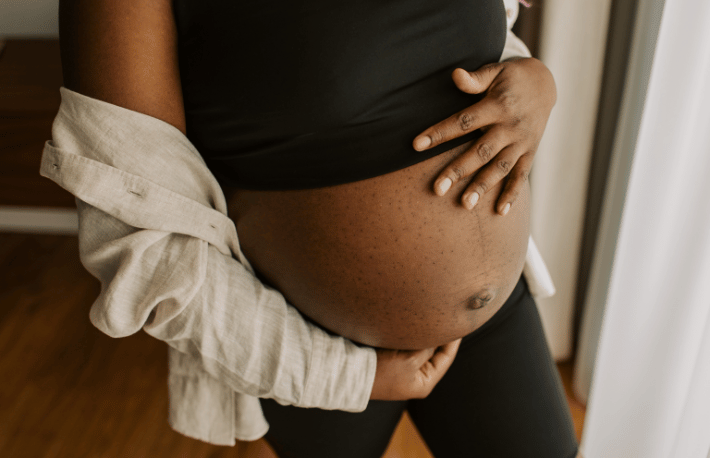
While itchy hands and feet are one of the most prominent symptoms of cholestasis, itching may happen from something very minor, too. Itching itself cannot be a determining factor that you may have cholestasis. This kind of itching starts from the hands and feet and spreads to the rest of the body parts. And it gets unbearable at night. However, you do not get rashes from cholestasis, unlike the other conditions that cause an itch.
The lesser common symptoms of cholestasis may include:
- Dark urine
- Nausea
- Extreme tiredness
- Pale brown or light gray poop
- Decreased appetite
- Jaundice
- Pain in the upper right portion of the belly
Causes Behind Cholestasis In Pregnancy
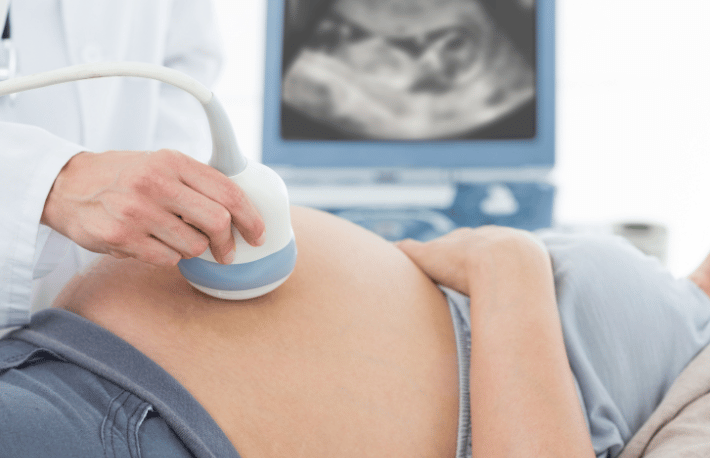
Your liver produces bile that gets stored in the gallbladder. Bile helps in breaking down fats into fatty acids for the intestines to absorb. Cholestasis is the condition where the usual flow of bile from the liver to the intestines slows down, resulting in a bile build-up in the liver. This bile later spills into the bloodstream, causing intense itching.
The possible causes behind cholestasis may include:
- Hormonal changes: An increase in the level of estrogen during pregnancy, mainly in the third trimester, may slow down the flow of bile from the liver to the intestines.
- Genetic disposition: If any of your immediate family members have a history of cholestasis during pregnancy, make sure you inform your doctor at the very beginning of your pregnancy.
- Gallstones: A collection of tiny stone masses present in the gallbladder caused by the imbalance of bile may be one of the bigger culprits. In fact, pregnant women are usually more at risk of developing gallstones due to the increase in their estrogen levels.
Cholestasis is more common in women who are carrying more multiples and the ones who have had liver damage previously. If you have experienced cholestasis in your previous pregnancy, there is a higher chance that you are to experience the same in your subsequent ones, too.
Treatments For Itchy Feet During Pregnancy
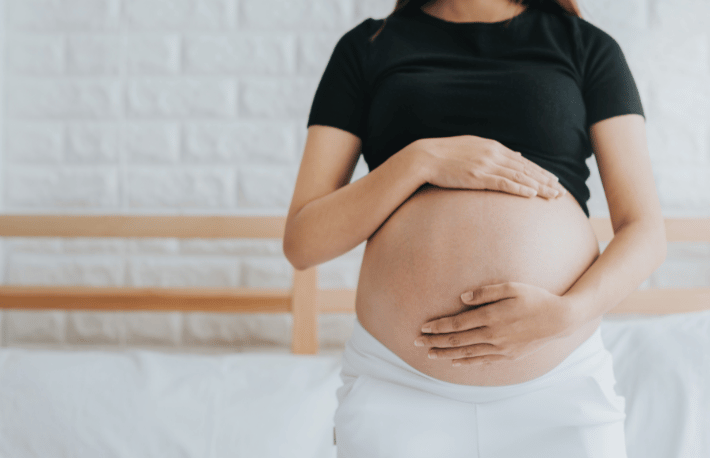
In most cases, itchy feet during pregnancy may just be because of the simpler and less serious reasons that we have mentioned. If you are not seeing any other symptoms than mild itching, there is nothing that you need to worry about.
For normal, itchy feet, here are a few tips that will help reduce the itchiness and give you the relief that you so desperately need.
Calming Oatmeal Baths
This effective and natural remedy is very easy to try at home. Every pregnant mama loves a nice, comforting soak in the tub. However, if you do wish to add essential oils, too, confirm with your doctor which ones are safe during pregnancy. Essential oils may further increase the itchiness as they are all not safe for use during pregnancy.
Cold
Cold-wash clothes, cool footbaths, or even ice packs wrapped in thin towels can be applied on the feet to soothe your itchy spot. Do not apply ice for more than fifteen minutes.
New Socks
Socks that fit you loosely and are made of breathable, natural fibers like cotton or wool may help your feet from getting itchy and sweaty.
Massage
A nice foot massage can easily distract the nerves and reduce the itchiness. This does not have to be a professional massage. You or your partner can easily do it if they are willing to do so. Just make sure that you go in with gentle strokes and avoid all the acupressure points on your feet and around the ankles. There are some points that might stimulate uterine contractions.
Moisturizers
A normal, fragrance-free moisturizer like shea butter, cocoa butter, or colloidal oatmeal may help soothe itchy feet during pregnancy. Check with your doctor before you use any type of topical medicine like calamine lotion or any other lotions with diphenhydramine. They might not be the safest options during pregnancy.
Medications
If you are having itchy feet due to psoriasis or eczema, talk with your doctor before you have any sort of medications. Many of the over-the-counter medications are not really safe for consumption during pregnancy. Only your doctor can suggest alternatives that are safe for pregnant women. One preferable psoriasis treatment at the time of pregnancy is ultraviolet B phototherapy. If your itchy feet make you lose your sleep over the night, do not just stick to the age-old home remedies. Your doctor might come up with certain ways that are actually helpful and will give you some relief faster than home remedies.
What To Do If You Have Cholestasis?
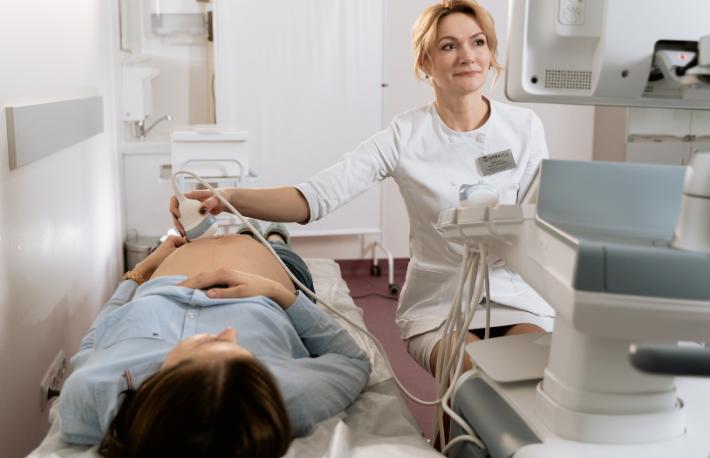
First of all, remain calm. We know things might scare you, but you need to be as patient as possible, given you have a baby growing inside of you. If you feel like your symptoms match those of cholestasis, call your doctor immediately.
They will immediately do a blood test to confirm your liver function, along with an ultrasound known as a biophysical profile to check on the heartbeat, breathing, movement, fluid levels, and blood flow of your baby.
If you do get diagnosed with cholestasis, you and the baby will be monitored more frequently. Some of the possible tests and treatments may include:
- Blood work to check the liver function
- Nonstress test with biophysical profile
- Soaking the itchy patches in lukewarm or cool water
- Medications like ursodiol to reduce bile accumulation
- Premature delivery of the baby
While it is indeed too scary to deliver the baby before the expected date, your doctor will weigh both the risks of early delivery and continuing the pregnancy with cholestasis.
Cholestasis risks can be pretty high. So, it is usually safe to deliver the baby, particularly if you are around 37 weeks pregnant. Babies born around this time do surprisingly well. And you will be able to hold your little bundle of joy sooner than you expect.
Cholestasis Treatment During Pregnancy
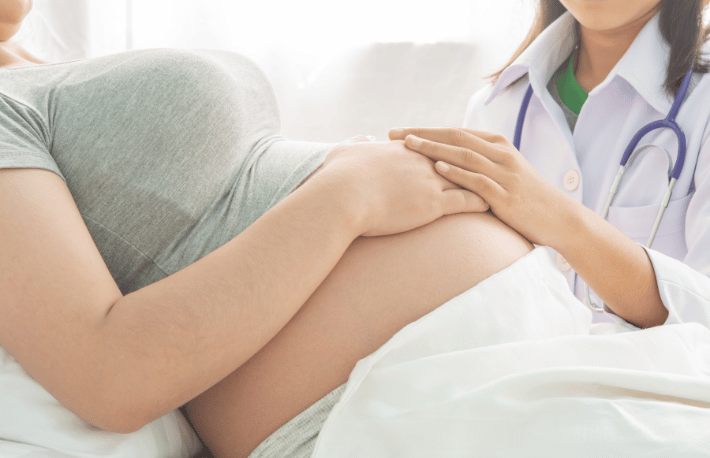
Doctors usually use a medicine called ursodeoxycholic acid to treat cholestasis at the time of pregnancy. This medication improves the ability of the liver to function optimally and reduces bile levels in the blood.
Medical treatments to deal with the symptoms of cholestasis during pregnancy are:
- Anti-itching medication
- Wearing loose-fitting, soft clothes
- Lots of rest
- Soaking in a lukewarm bath
If these medications do not work to lower the bile levels, your doctor might suggest you deliver the baby early. Induced labor around the 37th or 38th week might lessen the complications caused by cholestasis during pregnancy. Your doctor will monitor your fetus for any signs of potential problems through the tests mentioned in the previous section.
The Bottom Line
Itchy feet during pregnancy are nothing to be scared of. There are multiple reasons why your body reacts that way. With the line of changes that go on in your body during pregnancy, such discomforts are pretty common.
However, you need to be a bit more cautious if there are other symptoms, too. Pregnant women are usually at a slight risk of developing cholestasis, a disease caused when liver function slows down, causing the bile to spill out in the bloodstream, resulting in itchy patches throughout the body. In the case of cholestasis, itching starts from the hand and feet and later on spreads all around the body. Cholestasis is a serious disease and needs immediate treatment. Leaving it may cause some serious health issues for the baby, including stillbirth.
The chances of cholestasis are usually in the third trimester. So your doctor can either give you medications or induce early labor for the healthy delivery of the baby.
Frequently Asked Questions
Yes, having cholestasis during pregnancy does not mean you’d deliver an unhealthy baby. With the right precautions, you can birth a healthy and well-nourished baby.
Itchy feet during pregnancy may happen due to a number of reasons that do not pose any threat. However, if the symptoms get worse at night, or if you see other symptoms like dark urine, tiredness, light brown or gray poop, Jaundice, or reduced appetite, it is better to inform your doctor immediately.
When there is no serious underlying reason behind it, you can reduce the itching in your feet by wearing loose fit, comfortable socks, moisturizer, ice packs, etc.
Your doctor will suggest certain foods depending on your condition. However, there is no standard diet to follow if you at all get diagnosed with cholestasis. However, you must maintain a balanced diet throughout. Eat lots of lean meat, veggies, fruits, or other sources of protein during pregnancy.
ADDITIONAL READING:
- Here Are The Signs Your Pregnancy Is Going Well In The First Trimester!
- What To Eat Before Pregnancy Glucose Test? Let’s Find Out!
- Stages Of Labor: Determine The Arrival Of Your Little One
Leave a Reply
All Comments
Already have an account?
Sign In
Create your account
User added successfully. Log in







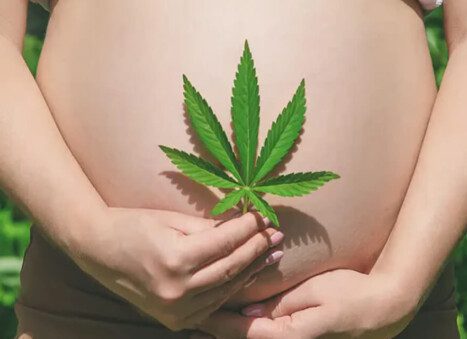

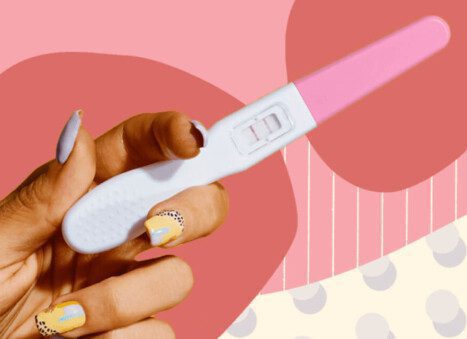
Mary Jane
10th June, 202425 July 2023 at 10:08 AM |
I just could not leave your web site before suggesting that I really enjoyed the standard information a person supply to your visitors Is gonna be again steadily in order to check up on new posts